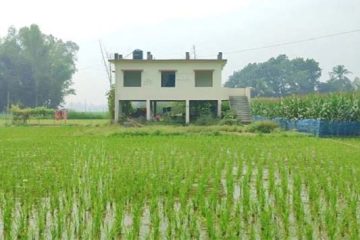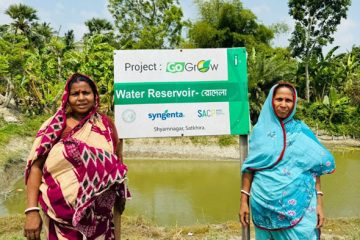Shahidul Islam Chowdhury
When nature calls, most of the time Liza, 6, falls in trouble as her family does not own a latrine.
‘At times, I have to defecate in open spaces, no matter whether it is day or night, even knowing that it is bad,’ she said on Tuesday in the yard of their home in Dautia village of Dhamrai upazila, about 40 km from the capital.
Liza’s brother Azizul, 11, said they are sometimes allowed to use a latrine owned by a paternal uncle. ‘They [uncle’s family members] always keep us waiting even though we are in a hurry to relieve ourselves,’ he complained. When asked if she would defecate in the open if they got a lavatory someday, Liza, a student of elementary class, said, ‘Never!’
Halima, 18, mother of a four-year-old girl, said they have built a lavatory at the cost of about Tk 1,000.
‘BRAC gave us the money which is repayable in 11 equal instalments,’ she said. ‘BRAC takes Tk 100, in addition to Tk 1000, taka as service charge.’
About 20 adolescent girls including Tania, Moushumi, Rabeya and Sathi, who are Class V to Class X students in different schools, were holding a formal meeting at Depashai village in the same upazila.
‘We discuss how we can maintain hygiene in every sphere of life, and at the personal, family and social levels,’ said Sathi, a class V student. ‘We share our knowledge of hygiene with our friends.’
Even three months back, many girl students of Shuapur Nannar High School in Dhamrai had to remain absent in classes as there was no exclusive bathroom for them.
‘It was very difficult for us to remain clean, and even to answer nature’s call, in class hours,’ says Sraboni Sarkar, a Class IX student of the school. ‘But now we have a place, equipped with a tube-well for water and a waste basket for disposable things.’
Mohammad Ashraful Islam, headmaster of the school, said, ‘Now the girls’ absence in classes has drastically decreased. The number of drop-outs will also shrink.’
The school management built the bathroom for girls last October at a cost of Tk 97,120. BRAC, under its WASH programme, donated Tk 35,000 to install the girls’ bathroom, he said.
It was BRAC which persuaded the school management to build a bathroom exclusively for girls, he said.
‘Drinking safe water, using sandals while going to the toilet, washing hands with soap before taking meals and after defecating, and washing the lower part of the body with hot water and soap after menstrual bleeding are no longer strange things to us,’ said Sraboni.
Tanjeba Ambereen Haque, programme manager of the BRAC’s WASH programme, said an exclusive place with water supply and disposal facilities helps girls, who are future mothers, to maintain personal as well as menstrual hygiene.
Kamar Ali, 70, a villager in Dautia, said people are also taking loans of Tk 4,000 to 5,000 from BRAC for installing tube-wells in their yards.
Tanjiba said BRAC launched a 5-year programme in May 2006 to provide sanitation services to 17.6 million people, safe water to 8.5 million people, and knowledge of primary hygiene to 37.5 million people in 150, out of 481, upazilas in 40, out of 64, districts.
According to BRAC’s officials, about 2,32,666 new latrines for the poor, 2,51,814 latrines for people not so poor, 39,737 free latrines for hardcore poor families and 641 deep tube-wells were installed across the country under the WASH programme by 2008.
It is a Tk 456 crore programme launched in collaboration with the government and other local and international NGOs, they said, adding that the Netherlands provided Tk 416 crore for the programme.
According to researchers, lack of safe drinking water and sanitation facilities forces the country to spend about Tk 5,000 crore every year for treatment of water-borne diseases.
Sheikh Khurshid Alam, secretary to the Local Government Division, said the government would continue its efforts to ensure safe drinking water and environment-friendly latrines for all by 2015.
Courtesy: newagebd.com






